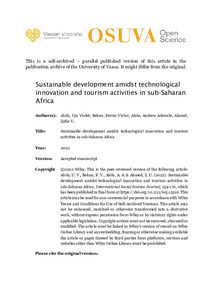Sustainable development amidst technological innovation and tourism activities in sub-Saharan Africa
Alola, Uju Violet; Bekun, Festus Victor; Alola, Andrew Adewale; Ahmed, Zafar U. (2022-02-11)
Alola, Uju Violet
Bekun, Festus Victor
Alola, Andrew Adewale
Ahmed, Zafar U.
Wiley
11.02.2022
Julkaisun pysyvä osoite on
https://urn.fi/URN:NBN:fi-fe2022022320614
https://urn.fi/URN:NBN:fi-fe2022022320614
Kuvaus
vertaisarvioitu
©2022 Wiley. This is the peer reviewed version of the following article: Alola, U. V., Bekun, F. V., Alola, A. A. & Ahmed, Z. U. (2022). Sustainable development amidst technological innovation and tourism activities in sub-Saharan Africa. International Social Science Journal, 159-170, which has been published in final form at https://doi.org/10.1111/issj.12316. This article may be used for non-commercial purposes in accordance with Wiley Terms and Conditions for Use of Self-Archived Versions. This article may not be enhanced, enriched or otherwise transformed into a derivative work, without express permission from Wiley or by statutory rights under applicable legislation. Copyright notices must not be removed, obscured or modified. The article must be linked to Wiley’s version of record on Wiley Online Library and any embedding, framing or otherwise making available the article or pages thereof by third parties from platforms, services and websites other than Wiley Online Library must be prohibited.
©2022 Wiley. This is the peer reviewed version of the following article: Alola, U. V., Bekun, F. V., Alola, A. A. & Ahmed, Z. U. (2022). Sustainable development amidst technological innovation and tourism activities in sub-Saharan Africa. International Social Science Journal, 159-170, which has been published in final form at https://doi.org/10.1111/issj.12316. This article may be used for non-commercial purposes in accordance with Wiley Terms and Conditions for Use of Self-Archived Versions. This article may not be enhanced, enriched or otherwise transformed into a derivative work, without express permission from Wiley or by statutory rights under applicable legislation. Copyright notices must not be removed, obscured or modified. The article must be linked to Wiley’s version of record on Wiley Online Library and any embedding, framing or otherwise making available the article or pages thereof by third parties from platforms, services and websites other than Wiley Online Library must be prohibited.
Tiivistelmä
Following global debate on clean and responsible access to energy (electricity), access to recreation (tourism), technological innovation, and economic growth for sustainable development as captured by the Human Development Index (HDI), the present study is motivated by the inconclusive guidance found in the literature on technology, tourism industry, and energy. This study adopts the Pedroni residual cointegration test to investigate the cointegration properties of the variables under consideration, while the mean group (MG), dynamic fixed effect (DFE), and the pooled mean group (PMG) estimators are employed for simultaneous short- and long-run analysis. The study is based on annual frequency data from 1995 to 2016 with the adoption of panel analysis to show that technological innovation, tourism development, and access to electricity affected the HDI significantly in sub-Saharan Africa (SSA) over the investigated study period. This is instructive for policymakers, as the highlighted sectors are good predictors of sustainable development. Furthermore, consolidating the results that tourism development, electricity access, and technological innovation improves economic development. On the other hand, the growth-induced, HDI-fitted model reflects the importance of the examined variables in the sustainable development agenda of the continent. For instance, a 1% increase in tourism increases economic growth by 0.0195%. Similarly, a 1% increase in access to electricity and technological development increases economic growth by 0.0019% and 0.0009%, respectively. In conclusion, this study highlights the multifaceted merits that can be gleaned from access to electricity, tourism, and technological innovation in SSA, as they improve economic growth and HDI indicators that comprise life expectancy, quality education, and per capita income level.
Kokoelmat
- Artikkelit [2621]
